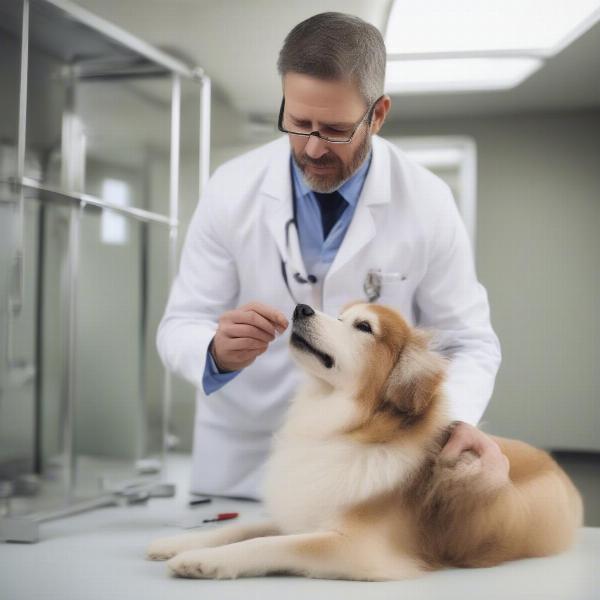Raw milk for dogs has become a topic of increasing interest among pet owners. Many are drawn to the perceived natural and wholesome qualities, believing it offers superior nutrition compared to commercial dog food. But is raw milk truly beneficial, or does it pose hidden risks? This article delves into the potential benefits and risks of feeding raw milk to your canine companion, providing you with the information you need to make informed decisions about their diet.
Understanding the Appeal of Raw Milk
Advocates of raw milk for dogs often highlight its rich nutrient profile, including vitamins, minerals, and enzymes. They suggest it can boost immunity, improve digestion, and enhance coat health. Some believe that raw milk is closer to a dog’s ancestral diet and therefore more natural than processed alternatives. However, these claims require careful scrutiny in light of potential health concerns.
Potential Risks of Raw Milk for Dogs
The primary concern with raw milk is the risk of bacterial contamination. Pathogens like Salmonella, E. coli, and Listeria can be present in unpasteurized milk and pose a significant threat to both dogs and humans. Puppies, senior dogs, and those with weakened immune systems are particularly vulnerable. Symptoms of bacterial infection can range from mild gastrointestinal upset to severe illness requiring veterinary intervention.
Nutritional Benefits and Considerations
While raw milk does contain valuable nutrients, these can also be obtained from commercially available dog food formulated to meet a dog’s specific dietary needs. galastop dogs Pasteurization, the process of heating milk to kill harmful bacteria, also destroys some heat-sensitive vitamins. However, the overall nutritional impact of pasteurization is minimal, and the safety benefits significantly outweigh the losses.
Is Raw Milk Right for Your Dog?
The decision of whether or not to give your dog raw milk is a personal one. Weighing the potential risks against the perceived benefits is crucial. Consulting with your veterinarian is highly recommended. They can assess your dog’s individual health needs and provide tailored advice based on their specific circumstances.
 Veterinarian Examining a Dog
Veterinarian Examining a Dog
Alternatives to Raw Milk
Several safe and nutritious alternatives to raw milk exist. dog milk of magnesia Goat’s milk, specifically formulated for dogs and pasteurized, is a popular choice. primal goat milk for dogs powdered goats milk for dogs It offers similar nutritional benefits without the same risks associated with raw cow’s milk. Always ensure any milk products you give your dog are specifically designed for canine consumption.
Conclusion
Raw milk for dogs presents a complex dilemma. While it may contain beneficial nutrients, the risk of bacterial contamination is a serious concern. Prioritizing your dog’s health and safety by opting for safer alternatives, such as pasteurized goat’s milk or a balanced commercial diet, is often the most prudent approach. Always consult your veterinarian before making any significant changes to your dog’s diet, including introducing raw milk.
FAQ
- Is raw goat’s milk safer than raw cow’s milk for dogs? While goat’s milk is often touted as easier to digest, it still carries the risk of bacterial contamination if unpasteurized.
- What are the signs of milk intolerance in dogs? Symptoms can include vomiting, diarrhea, gas, and itchy skin.
- Can puppies drink raw milk? Puppies are particularly susceptible to bacterial infections from raw milk and should not be given unpasteurized milk products.
- Are there any benefits to adding raw milk to dog food? The risks associated with raw milk generally outweigh any potential benefits, especially given the availability of nutritionally complete dog foods.
- What should I do if my dog drinks raw milk and gets sick? Contact your veterinarian immediately if your dog exhibits any signs of illness after consuming raw milk.
- Are there any dog breeds that tolerate raw milk better than others? No breed is immune to the potential dangers of bacterial contamination from raw milk.
- Can I give my dog lactose-free milk? While lactose-free milk reduces the risk of lactose intolerance, it still poses a bacterial risk if unpasteurized.
Related Articles
About ILM Dog
ILM Dog is your trusted source for comprehensive information on dog care, offering expert advice on everything from breed selection and health to training and nutrition. We cover various aspects of dog ownership, including health and wellness, training and behavior, nutrition and feeding, grooming and hygiene, exercise and activities, puppy care, senior dog care, traveling with dogs, and product recommendations. Our aim is to empower dog owners worldwide with the knowledge and resources they need to provide the best possible care for their furry companions. For any inquiries, reach out to us via email at [email protected] or call us at +44 20-3965-8624.